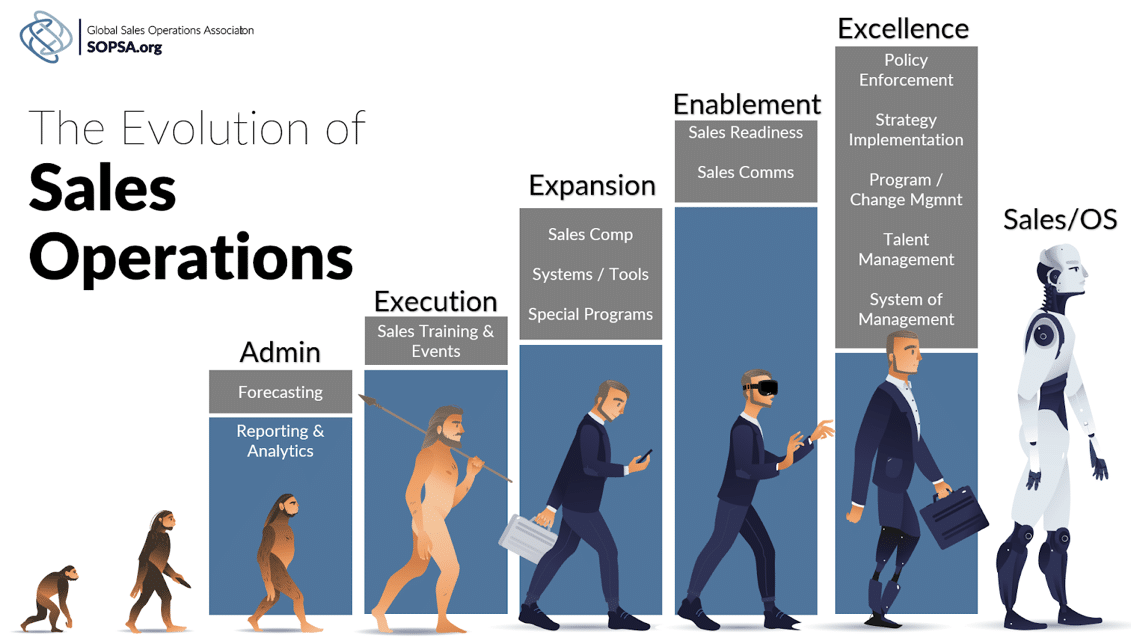Originally posted on SOPSA.org
Can you Identify?
During the last two months, I have had the opportunity to speak with nearly 200 sales operations leaders from all over the globe. In nearly every introductory conversation, the discussion quickly turns to the path each person took that brought them to Sales Operations leadership.
In my discussions, I found people who began their career in finance, sales, marketing, HR and IT. Not much surprise in those. However, there were many who came to Sales Ops from much more diverse backgrounds. In San Diego, I met two who began their careers as attorneys and even one astrophysicist!
What I did not find, however, were any individuals who went to university and studied to become sales operations leaders.
The things we do are just not taught in school and must be learned on the job.
Stop for a moment and put yourself in the shoes of a new Sales Ops leader. That might not be too hard; it may be you right now! Anyway, here you are with a wealth of training in skills from other functions. You now have a team of people who have been working in Sales Ops longer than you. You have executive leaders that are expecting you to quickly make sense of your new world and launch an evolution of the Sales Ops function within the business in order for execution and effectiveness to reach new levels. Where do you start? How do you make sense of what you have inherited and build a roadmap that will guide your next steps forward? How do you communicate to your team where they are headed? How do you gain buy-in from your executives on the priorities ahead?
These are pressing questions. If you can show that you have answers and can bring others on board with a coherent plan, you will be on your way to success. At a minimum,you will have bought more time to keep learning.
You Are Here
If you are new to Sales Ops, it is important that you become familiar with the history of the function.
When you know how Sales Ops evolved as a function, you will be able to see signals within your own organization about the level of process maturity you have inherited.
The Evolution of Sales Operations
The topic of “Evolution of Sales Operations” is one that produces a plethora of search results on Google. As a practitioner, I find most of these articles much more frustrating than helpful. What I find is that the authors of these articles generally have never lived the life of a Sales Ops leader, have something to sell me, or are extremely generic in their answers. Out of the necessity to explain Sales Ops to my peers in executive leadership and to guide my team, I built the chart which you will find below. Please feel free to ‘leverage’ this chart for your own use. If you want the full size PPT, zap me an email and I will share it with you…

This chart really represents two evolutions. First, the evolution of the function of Sales Operations as a defined practice in business. Second, it represents the typical evolution of the function within companies as they grow over time.
Ad Hoc to Admin
It is generally held that Sales Operations as a function began at Xerox in the 1970s. The initiative was started for the same reason that growing companies today start Sales Operations. When sales leaders need more visibility to the business, they make the case to allocate resources to the function. The expectation is that a group of specialists who have the time to manipulate data and prepare it for regular presentation will free up the sales leader from that work and provide a more reliable set of reports to drive the business. Quickly after basic reporting and analytics are regularly produced, the attention turns to that new factory to produce a regular, reliable forecast report.
The Execution Era
As the sales leaders gain trust in the Sales Operations team, the next major items they need assistance with are the training of sales people and the delivery of major events. To be successful in this new era of Sales Operations, the leader who has been very successful using their technical skills to build out analytics capability will need to tap into a different side of their personality in order to properly deliver effective training and sales events.
To deliver on the expanded mandate, the Sales Ops leader can either expand the core team with trainers and event managers, or act as the central point of coordination for an extended team which lives out in other functions of the business. For example, partnering with product management, HR and third parties for sales training, or with marketing for events.
The Expansion Era
Up to this point in the journey, many companies get by without a single head of Sales Operations. Through the Admin and Execution phases, many sales leaders have multiple individuals which cover the delegated areas reporting to them . It is in the Expansion era that having a single head of Sales Operations becomes
critical. As a new leader of Sales Ops, this may be where you presently stand as you read this article. By this time in the journey, there is likely a systems team, a reporting team who is doing extra work on compensation reporting, a training team and maybe even individuals heading up various special projects.
Caution: The Expansion Era is where many Sales Ops transformation projects stall out.
Stall in this phase is common in growing firms due to constrained resources. If the Sales Ops team is not making significant progress in showing the value of the function, they will not receive more resources. A symptom of this is when you see ‘shadow’ organizations springing up in the extended sales team. You might begin to hear things like, “Oh, I use my own forecast reports…don’t bother.” or “We are so different that we have our own training and events.” These are clear signs that there is work to be done.
Stall also occurs in large corporations at this point as well. Often, my discussions with Sales Ops leaders in large and very large, multinational companies center around the challenges involved in implementing new, centralized processes in their mature business. When there are multiple business units, even minor variation in the business models of each unit can be a challenge to implementing corporate standards. It is very important that the Sales Operations leaders take the proper amount of time to analyze the challenges, similarities and political landscape before boldly pursuing a plan to centralize processes. In this situation, having the mindshare of the executives leading the various business units is a must and will not come immediately.
The Enablement Era
Since the term was coined around 2006, Sales Enablement has won the prize for the most often discussed and most commonly misunderstood topic in Sales Operations. When a Sales Operations team is handed the mandate to go beyond basic sales training and move toward a more comprehensive program that marries the buyer and seller journeys, then you are clearly in the Enablement Era. Be careful. If you listen to vendors, you will come away with the expectation that some new forms of assessment or reconfigured solutions selling training program will be the cure-all. Others will appeal to your desire to upgrade your tech stack and will show you “integrated,” “mobile” solutions to deliver “bite-sized” training and content to your team.
Caution: Before going down the path of training or tech selection, back up and do the hard work of mapping your buyer and seller journeys. Listen carefully to your sales team. Examine what materials they use and what they may even be creating themselves out of necessity.
The value of Sales Operations can take a major leap forward when Sales Enablement capabilities are brought into the function correctly. A well-oiled enablement machine will pick up new initiatives that need to be launched into the sales team and will coordinate across the entire company to make sure the sales team has the tools, messaging and training they need to meet the customer exactly where they are on their own journey. More than any other function of Sales Operations, Enablement lives at the crossroads of all functions of the business and is charged with ensuring that their customer–the sales team–is represented in internal discussions.
The Era of Excellence
At some point in the Sales Operations journey, the executive team issues the head of Sales Ops a badge and a weapon along with the charge to be an enforcer. That last sentence is only a slight exaggeration. At some point Sales Operations moves from being strictly a servant of sales and onto the role of policy enforcement. True, there may be some standards and rules put in place during other phases around CRM use, reporting standards, compensation programs and the like. However, in more mature organizations the Sales Excellence function establishes a system of sales management that dictates how sales management is done at the company. Along with this system of management come standards for pricing, approvals, terms and order placement. While in lesser evolved organizations, the same commercial leaders who run the sales teams also hold the responsibility for all approvals, it is common to find those in the Excellence era to have Sales Operations report to a co-equal leader to maintain the ability to enforce policy. Sales Ops leaders, during this stage of evolution, will likely be peers of the sales leaders or perhaps report to the COO or CFO.
In later articles, I will describe in detail the Sales Excellence phase of evolution and the manner in which it is effectively conducted.
Revenue Operations
It is worth noting that in fast growing high-tech companies who have raced through the evolution of Sales Operations in only a few short years, there is a strong push toward evolving on a slightly different path than Sales Excellence. We are seeing the rise of Revenue Operations as an alternate path. These firms are finding great promises in combining Sales Operations with the upstream Marketing Operations and the downstream Customer Success teams. The expectation is that by having a more systemic view to all processes from awareness through to renewal will drive more efficiency and effectiveness. Early indications are showing good results. If your company fits this profile, you should consider building a roadmap that makes its way through Enablement and on to Revenue Operations.
The Sales/OS
The entire Sales Operations evolutionary journey is designed to build a commercial capability that is actively managed, easy to sell for and lives inside a High Performance Culture. Once operating practices are standardized and integrated across the entire sales team, the company has what is effectively a Sales Operating System. The OS on your computer controls all the basic input/output functions for a multitude of complicated and diverse devices, thereby allowing the computing platform to suit the needs of the user. Some
users run MS-Office, some create amazing graphic arts and music, others play games. One single platform with a connecting OS makes this possible. When Sales Operations is fully evolved, it provides a set of services that allow effective and efficient execution of diverse sales strategies. As the business adapts to market demands, that same platform is ready and able to step up and serve the needs without massive reconfiguration.
Conclusion
Ok new Sales Operations leader, you now have an understanding of the evolution of Sales Operations. It is my hope that you can use this understanding to quickly evaluate the journey in front of you and build a plan to rally your team and executive leaders around a vision for the value that further investment in Sales Operations can bring to your company.
Take your unique background and the success that has brought you to this new role and use those skills to make an impact.
Finally
Remember, you are not alone on your journey to improving Sales Operations. There is a community of others like you here in SOPSA that stand ready and willing to help.



